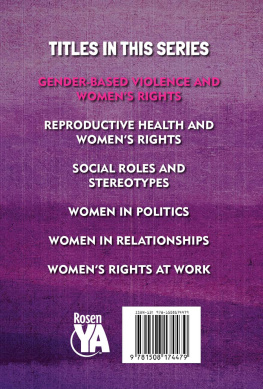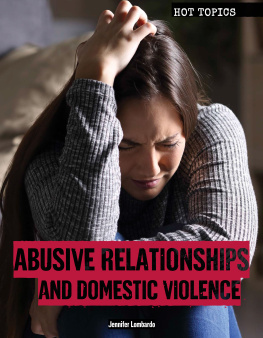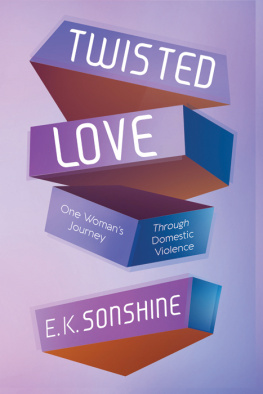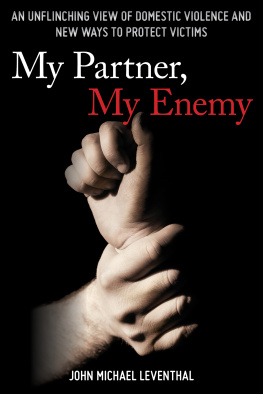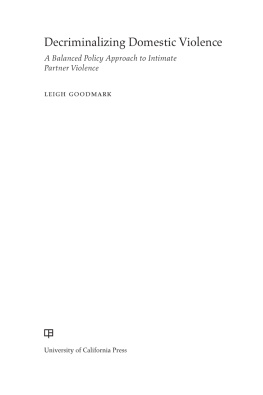Published in 2018 by The Rosen Publishing Group, Inc.
29 East 21st Street, New York, NY 10010
Copyright 2018 by The Rosen Publishing Group, Inc.
First Edition
All rights reserved. No part of this book may be reproduced in any form without permission in writing from the publisher, except by a reviewer.
Library of Congress Cataloging-in-Publication Data
Names: Lowery, Zoe, author. | Bickerstaff, Linda, author.
Title: Gender-based violence and womens rights / Zoe Lowery and Linda Bickerstaff.
Description: New York : Rosen Publishing, [2018] | Series: Women in the world | Audience: Grades 712. | Includes bibliographical references and index.
Identifiers: LCCN 2017010121 | ISBN 9781508174479 (library bound : alk. paper)
Subjects: LCSH: WomenViolence againstJuvenile literature. | Wife abuseJuvenile literature. | Sex discrimination against womenJuvenile literature. | Womens rights Juvenile literature.
Classification: LCC HV6250.4.W65 L69 2018 | DDC 362.88082dc23
LC record available at https://lccn.loc.gov/2017010121
Manufactured in the United States of America
CONTENTS
INTRODUCTION
CHAPTER 1
DOMESTIC AND INTIMATE PARTNER VIOLENCE
CHAPTER 2
VISUAL, VERBAL, AND PHYSICAL: SEXUAL VIOLENCE
CHAPTER 3
DANGEROUS DATING
CHAPTER 4
BY AND WITHIN THE MILITARY
CHAPTER 5
SEEKING SOLUTIONS
GLOSSARY
FOR MORE INFORMATION
FOR FURTHER READING
BIBLIOGRAPHY
INDEX
INTRODUCTION
O n the night of January 18, 2015, two Stanford University graduate students were riding their bicycles home when they saw a man on top of a motionless woman. They were behind a dumpster; the woman was unconscious and some of her clothes were ripped off. The two students prevented the attacker, Brock Turner, from running away and held him until the police arrived.
In a widely publicized court case, the victim was repeatedly forced to relive her horrific experience. Brock Turner, a Stanford star swimmer, was eventually convicted of sexual assault with an attempt to rape an intoxicated woman and sexually penetrating an intoxicated and unconscious person with a foreign object, reported the Guardian s Sam Levin. He was sentenced to six months in county jail, but this sentence was curiously lighter than the states recommendation of two years in the state prison.
Women have been subjected to violence since prehistoric times. Books such as the Bible and the Quran (Koran) have not only documented but condoned it; customs and laws have justified it. Violence against women is deep-seated in the conviction that, in short, women are less valuable than men.
In America, the colonists developed the laws with which they were familiar back in England. So colonial American women had only a few scant additional freedoms than slaves, servants, and children. Even without any kind of evidence, women and girls were accused of witchcraft and other practices, for which they were sentenced to death by men who made and enforced the laws. Wife beating, or chastisement, was a husbands legal right in the United States until the early 1870s. And it wasnt for another century that the law began to recognize violence against women. Fortunately, and finally, people who felt that women were experiencing discrimination in the United States united to start the feminist movement, which led the fight to end violence against women that persists today. It continues to affect women in every demographic and population all over the world, and includes the lesbian, gay, bisexual, transgender, and queer (LGBTQ) as well.
There is a small glimmer of hope amid the horrors experienced by Turners victims experience. The legislature of California passed a bill that would block judges from giving such light sentences in rape cases. According to a Rolling Stone article by Elias Leight, Sexually assaulting an unconscious or intoxicated victim is a terrible crime and our laws need to reflect that, Democratic Assemblyman Bill Dodd, who co-authored the bill, said in a statement. This bill is about more than sentencing, he added. Its about supporting victims and changing the culture on our college campuses to help prevent future crimes.
Bridget Bishop was just one of many women who suffered under scant colonial freedoms in America and was unjustly hanged when she was accused of witchcraft.
Brock Turner has served his sentence. He served three months out of six, because of good behavior, and three years of probation. And the victim? She addressed Turner in court: Your damage was concrete; stripped of titles, degrees, enrollment. My damage was internal, unseen, I carry it with me. You took away my worth, my privacy, my energy, my time, my safety, my intimacy, my confidence, my own voice, until today. Unfortunately, this victims deep, quiet damage is too common.
CHAPTER 1
DOMESTIC AND INTIMATE PARTNER VIOLENCE
D omestic violence is the most common type of violence directed toward girls and women. The actual incidence of domestic violence in the United States is hard to determine because it is underreported. The Centers for Disease Control and Prevention (CDC) reports that as many as one in three women and girls experience physical abuse from a partner at some time in their life. As with nearly all types of violence against women and girls, men are usually but not alwaysthe perpetrators. A CDC survey found that 44 percent of lesbians and 61 percent of bisexual women experience rape, physical violence, or stalking by an intimate partner, compared to 35 percent of heterosexual women.
Every girl and woman in the world is at risk of being a victim of violence. Thalif Deen, the UN bureau chief for the Inter Press Service (IPS), in Rights: UN Takes Lead on Ending Gender Violence, reports that UN Secretary-General Ban Ki-moon claims that one out of every three females in the world will be beaten, will be forced into having sex, or will otherwise be abused in her lifetime. Based on projected census data for 2010, Ki-moons estimates mean that 52.7 million girls and women in the United States and 1.2 billion worldwide may eventually be victims of violence if something isnt done to stop it.
With some exceptions, the perpetrators of violence against girls and women are men. Jackson Katz, in his book The Macho Paradox, says that 90 percent of acts of violence against women occur at the hands of men. Ninety-nine percent of rapists are men. Who are these men? They are fathers, brothers, uncles, teachers, the guys next door, or any man. But a National Violence Against Women survey revealed that domestic violence is a very real part of life within the LGBTQ community as well: 35.4 percent of women living with a same-sex partner experienced domestic violence. And transgender individuals are not much better off, with 34.6 percent.

